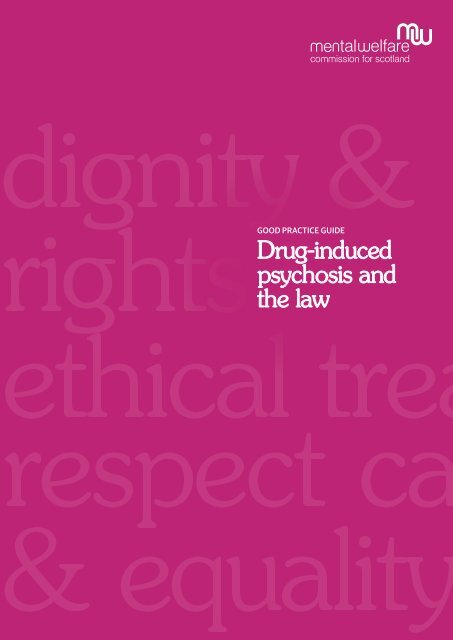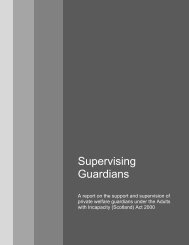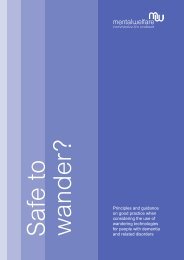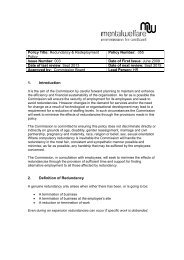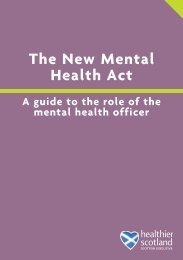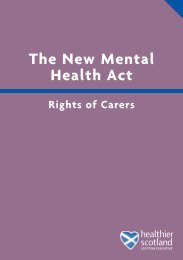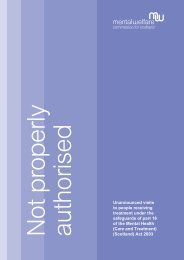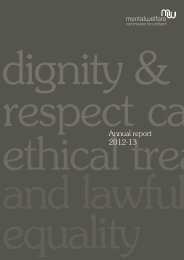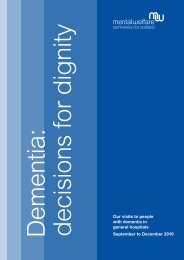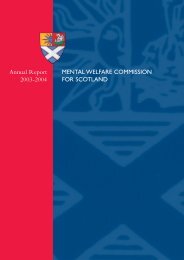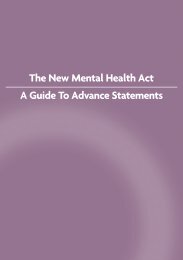Drug-induced psychosis and the law - Mental Welfare Commission ...
Drug-induced psychosis and the law - Mental Welfare Commission ...
Drug-induced psychosis and the law - Mental Welfare Commission ...
Create successful ePaper yourself
Turn your PDF publications into a flip-book with our unique Google optimized e-Paper software.
GOOD PRACTICE GUIDE<br />
<strong>Drug</strong>-<strong>induced</strong><br />
<strong>psychosis</strong> <strong>and</strong><br />
<strong>the</strong> <strong>law</strong>
Contents<br />
Introduction5<br />
Background7<br />
Compulsory measures to prevent drug misuse 13<br />
Conclusions15<br />
Use of mental health legislation 10<br />
3
Our aim<br />
We aim to ensure that care, treatment <strong>and</strong> support are <strong>law</strong>ful <strong>and</strong> respect <strong>the</strong> rights <strong>and</strong> promote<br />
<strong>the</strong> welfare of individuals with mental illness, learning disability <strong>and</strong> related conditions. We do this by<br />
empowering individuals <strong>and</strong> <strong>the</strong>ir carers <strong>and</strong> influencing <strong>and</strong> challenging service providers <strong>and</strong> policy<br />
makers.<br />
Why we do this<br />
Individuals may be vulnerable because <strong>the</strong>y are less able at times to safeguard <strong>the</strong>ir own interests. They<br />
can have restrictions placed on <strong>the</strong>m in order to receive care <strong>and</strong> treatment. When this happens, we<br />
make sure it is legal <strong>and</strong> ethical.<br />
Who we are<br />
We are an independent organisation set up by Parliament with a range of duties under mental health <strong>and</strong><br />
incapacity <strong>law</strong>. We draw on our experience as health <strong>and</strong> social care staff, service users <strong>and</strong> carers.<br />
Our values<br />
We believe individuals with mental illness, learning disability <strong>and</strong> related conditions should be treated<br />
with <strong>the</strong> same respect for <strong>the</strong>ir equality <strong>and</strong> human rights as all o<strong>the</strong>r citizens. They have <strong>the</strong> right to:<br />
• be treated with dignity <strong>and</strong> respect<br />
• ethical <strong>and</strong> <strong>law</strong>ful treatment <strong>and</strong> to live free from abuse, neglect or discrimination<br />
• care <strong>and</strong> treatment that best suit <strong>the</strong>ir needs<br />
• recovery from mental illness<br />
• lead as fulfilling a life as possible<br />
What we do<br />
Much of our work is at <strong>the</strong> complex interface between <strong>the</strong> individual’s rights, <strong>the</strong> <strong>law</strong> <strong>and</strong> ethics <strong>and</strong> <strong>the</strong><br />
care <strong>the</strong> person is receiving. We work across <strong>the</strong> continuum of health <strong>and</strong> social care.<br />
• We find out whe<strong>the</strong>r individual care <strong>and</strong> treatment is in line with <strong>the</strong> <strong>law</strong> <strong>and</strong> good practice<br />
• We challenge service providers to deliver best practice in mental health <strong>and</strong> learning disability care<br />
• We follow up on individual cases where we have concerns <strong>and</strong> may investigate fur<strong>the</strong>r<br />
• We provide information, advice <strong>and</strong> guidance to individuals, carers <strong>and</strong> service providers<br />
• We have a strong <strong>and</strong> influential voice in service policy <strong>and</strong> development<br />
• We promote best practice in applying mental health <strong>and</strong> incapacity <strong>law</strong> to individuals’ care <strong>and</strong><br />
treatment<br />
4
Introduction<br />
When is it appropriate to use mental health legislation for ‘drug-<strong>induced</strong> <strong>psychosis</strong>’? The following three<br />
cases are examples of <strong>the</strong> range of difficulties we heard about. Some details of <strong>the</strong>se cases have been<br />
changed to reduce <strong>the</strong> risk of identifying individuals.<br />
Case 1<br />
Alex had been known to mental health services for some time. He used amphetamines, cocaine <strong>and</strong><br />
cannabis intermittently. He had a diagnosis of probable schizophrenia. He became floridly psychotic<br />
with hallucinations <strong>and</strong> persecutory delusions after using drugs. On <strong>the</strong>se occasions, he often came to<br />
<strong>the</strong> attention of <strong>the</strong> police. He agreed to be admitted to hospital for short periods. Psychotic symptoms<br />
subsided within 48 hours. Between episodes, he was withdrawn <strong>and</strong> slightly paranoid. He had been<br />
offered addiction services but declined to attend. He was never treated under mental health legislation.<br />
He presented with an acute psychotic episode after taking drugs. He was apprehended by <strong>the</strong> police<br />
because he was acting bizarrely to strangers in <strong>the</strong> street. He had a concealed weapon but said it was for<br />
self defence. He had been hearing voices telling him to kill a family member. Police took him to hospital<br />
where, as usual, he agreed to be admitted informally.<br />
The next day, his psychotic symptoms subsided <strong>and</strong> he wished to go home. He was assessed as not<br />
detainable as <strong>the</strong>re were no ongoing psychotic symptoms. Unfortunately, he took amphetamines a few<br />
days later, acted on <strong>the</strong> voices he heard <strong>and</strong> killed a family member.<br />
Case 2<br />
Brian, aged 20 years, had been admitted to <strong>the</strong> psychiatric unit voluntarily. This was his first presentation<br />
<strong>and</strong> he was not previously known to psychiatric services. He had taken a large quantity of LSD along with<br />
cannabis. He was hallucinating <strong>and</strong> had no sense of what was real or not. He refused to stay, refused<br />
medication, said he wanted to kill himself <strong>and</strong> was detained under an emergency <strong>and</strong> <strong>the</strong>n a short-term<br />
detention certificate.<br />
With medication, he improved quickly <strong>and</strong> <strong>the</strong> detention certificate was revoked. He was discharged<br />
home with no mental health follow-up.<br />
Case 3<br />
Colin was in his forties. He had been diagnosed as having paranoid schizophrenia since his late twenties.<br />
He also used amphetamines regularly <strong>and</strong> o<strong>the</strong>r drugs at times. He had over 30 admissions to hospital<br />
because he became unwell as a result of using amphetamines <strong>and</strong> not taking his medication. He did not<br />
underst<strong>and</strong> that this caused him to become unwell.<br />
He was homeless for some time <strong>and</strong> came to <strong>the</strong> attention of services three years ago. He was detained<br />
in hospital <strong>and</strong> remains on a compulsory treatment order. He has spent time out of hospital <strong>and</strong> receives<br />
medication by depot injection, but he uses drugs at times <strong>and</strong> can experience psychotic symptoms.<br />
Sometimes, this causes him to behave violently, resulting in police involvement <strong>and</strong> readmission to<br />
hospital.<br />
5
The care team wants to support Colin in <strong>the</strong> community. The care plan would need to involve engaging<br />
Colin in help to address his drug taking. There is uncertainty about <strong>the</strong> use of compulsory powers to<br />
enforce this, as well as ensuring continued medication <strong>and</strong> support.<br />
These case examples show some of <strong>the</strong> dilemmas in using mental health legislation for people whose<br />
episodes of <strong>psychosis</strong> appear to be provoked by taking street drugs.<br />
• Should mental health legislation be used at all, especially for individuals who appear to make a very<br />
quick recovery?<br />
• How long should compulsory treatment continue?<br />
• Should it be used long term to try to prevent <strong>psychosis</strong> arising from drug use?<br />
We could find no existing guidance on <strong>the</strong> use of mental health legislation in any of <strong>the</strong> literature we<br />
examined. We thought that practitioners would benefit from some guidance in this area.<br />
How we approached <strong>the</strong> problem<br />
We needed <strong>the</strong> help of a wide range of organisations <strong>and</strong> individuals to answer <strong>the</strong>se questions. We<br />
contacted mental health, social work, voluntary, criminal justice, service user <strong>and</strong> carer organisations. We<br />
asked <strong>the</strong>m to provide cases where <strong>the</strong>re had been difficult decisions to make. Some of <strong>the</strong> cases <strong>the</strong>y<br />
submitted formed <strong>the</strong> basis for <strong>the</strong> above case examples. We invited <strong>the</strong>m to a consultation event in<br />
October 2012. Their views <strong>and</strong> advice formed <strong>the</strong> basis for this guidance. We are grateful to <strong>the</strong>m <strong>and</strong> to<br />
those who responded when we sent an earlier draft for wider consultation.<br />
6
BACKGROUND<br />
1. <strong>Mental</strong> health legislation<br />
We had to consider <strong>the</strong> grounds for compulsory treatment as set out in <strong>the</strong> <strong>Mental</strong> Health (Care <strong>and</strong><br />
Treatment) (Scotl<strong>and</strong>) Act 2003 (‘<strong>the</strong> 2003 Act’). Broadly, <strong>the</strong> grounds are:<br />
• The presence of ‘mental disorder’. This includes mental illness, learning disability <strong>and</strong> personality<br />
disorder. There are some exclusions. Most importantly, use of, or dependence on, alcohol or drugs<br />
does not in itself constitute mental disorder. <strong>Mental</strong> illness that results from drug or alcohol use, or<br />
accompanies it, is a mental disorder under <strong>the</strong> 2003 Act. The relationship between drugs <strong>and</strong> mental<br />
illness is complex <strong>and</strong> is dealt with in <strong>the</strong> next section.<br />
• There is treatment available for <strong>the</strong> mental disorder. Treatment is defined broadly <strong>and</strong> includes ‘care,<br />
nursing, psychological treatments, habilitation <strong>and</strong> rehabilitation’ in addition to physical treatments.<br />
• Significantly impaired decision-making ability (SIDMA). This applies to civil compulsory orders but not<br />
to orders relating to criminal procedures.<br />
• Risk: to <strong>the</strong> individual’s own health, safety or welfare or to <strong>the</strong> safety of any o<strong>the</strong>r person.<br />
• Necessity. There must be reasons why <strong>the</strong> individual cannot be treated without <strong>the</strong> use of<br />
compulsion.<br />
Detention <strong>and</strong> compulsory treatment are major interferences with individuals’ liberty <strong>and</strong> personal<br />
choice. The grounds for compulsion must always be properly documented <strong>and</strong> are open to challenge at<br />
<strong>the</strong> Tribunal. All long-term civil orders are granted by <strong>the</strong> Tribunal. It also reviews all long-term civil orders<br />
<strong>and</strong> all mental health orders granted after conviction for a criminal offence.<br />
The principles as set out in part one of <strong>the</strong> 2003 Act must guide all interventions.<br />
Principles of information, participation, range of options, maximum benefit, carer information <strong>and</strong><br />
support, minimum restriction of freedom <strong>and</strong> reciprocity are especially important.<br />
Under <strong>the</strong> 2003 Act, it is possible to test detained individuals for <strong>the</strong> presence of alcohol or drugs,<br />
but only in accordance with section 286 of <strong>the</strong> Act <strong>and</strong> associated regulations. The individual must be<br />
designated a ‘specified person’ <strong>and</strong> <strong>the</strong>re are specific safeguards that must be observed. This part of <strong>the</strong><br />
2003 Act applies to detained patients only. Our Specified Persons guidance 1 gives more information.<br />
Note that analysis of urine samples may not detect some ‘legal high’ drugs.<br />
2. Psychosis <strong>and</strong> drug use<br />
It is important to give a brief overview of <strong>the</strong> extensive literature on <strong>the</strong> complex interaction between<br />
street drugs <strong>and</strong> mental illness. Anyone wishing more detailed information should consult Psychosis<br />
with coexisting substance misuse; National Institute for Clinical Excellence guideline on assessment <strong>and</strong><br />
management in adults <strong>and</strong> young people. (NICE 2011) 2<br />
1 http://www.mwcscot.org.uk/media/51854/Specified%20Persons.pdf<br />
2 http://www.nice.org.uk/nicemedia/live/13414/53691/53691.pdf<br />
7
a) Diagnosis<br />
Diagnosis is made according to criteria laid down in recognised classification systems. In <strong>the</strong> UK, <strong>the</strong><br />
tenth Revision of <strong>the</strong> International Classification of Diseases (ICD-10) 3 is most often used. Sections<br />
F10 to 19 of ICD-10 cover ‘mental <strong>and</strong> behavioural disorders due to psychoactive substance use’. The<br />
categories include acute intoxication, harmful use, dependence <strong>and</strong> withdrawal. Psychotic disorder due<br />
to psychoactive substance use is characterised by:<br />
“A cluster of psychotic phenomena that occur during or following psychoactive substance use but that<br />
are not explained on <strong>the</strong> basis of acute intoxication alone <strong>and</strong> do not form part of a withdrawal state.<br />
The disorder is characterized by hallucinations (typically auditory, but often in more than one sensory<br />
modality), perceptual distortions, delusions (often of a paranoid or persecutory nature), psychomotor<br />
disturbances (excitement or stupor), <strong>and</strong> an abnormal affect, which may range from intense fear to<br />
ecstasy. The sensorium is usually clear but some degree of clouding of consciousness, though not<br />
severe confusion, may be present.”<br />
This can be hard to distinguish from mental illnesses that occur without being provoked by drug use.<br />
Research shows that <strong>the</strong> interactions between mental illness <strong>and</strong> substance misuse are complex.<br />
Bipolar disorder has <strong>the</strong> greatest risk for coexistence of an alcohol or drug disorder. There is an earlier<br />
onset <strong>and</strong> worse course of illness in those with bipolar disorder <strong>and</strong> a drug or alcohol disorder than<br />
those with bipolar disorder alone. People with schizophrenia are three times more likely than those<br />
without to abuse alcohol <strong>and</strong> six times more likely to abuse drugs. Some studies have suggested that<br />
as many as 47% of people with a diagnosis of schizophrenia have used drugs at some point. Research<br />
findings vary depending on where <strong>the</strong> studies are carried out. A lot depends on local drug availability <strong>and</strong><br />
culture. Those who use cannabis have a significantly higher rate of readmission to hospital <strong>and</strong> poorer<br />
psychosocial functioning than those who do not. Also, most people with ‘cannabis-<strong>induced</strong> <strong>psychosis</strong>’<br />
are later diagnosed as having schizophrenia. See <strong>the</strong> NICE guidance for more details on research findings.<br />
The NICE guidance also sums up <strong>the</strong> diagnostic dilemma as:<br />
1. Substance misuse ei<strong>the</strong>r precipitates <strong>the</strong> onset of, or is a direct cause of, <strong>psychosis</strong>.<br />
2. Substance misuse is a common consequence of a psychotic disorder.<br />
3. There is a common cause, or vulnerability, to both substance misuse <strong>and</strong> <strong>psychosis</strong>.<br />
b) Care <strong>and</strong> treatment<br />
The NICE guidance has important key recommendations. We have reproduced <strong>the</strong> most relevant ones<br />
below.<br />
General points<br />
• Take time to engage <strong>the</strong> person from <strong>the</strong> start <strong>and</strong> build a respectful, trusting, non-judgemental<br />
relationship.<br />
• Stigma <strong>and</strong> discrimination are associated with both <strong>psychosis</strong> <strong>and</strong> substance misuse. Some people<br />
will try to conceal ei<strong>the</strong>r one or both of <strong>the</strong>ir conditions.<br />
• Many people with <strong>psychosis</strong> <strong>and</strong> coexisting substance misuse fear being detained or imprisoned,<br />
being given psychiatric medication forcibly or having <strong>the</strong>ir children taken into care.<br />
3 http://apps.who.int/classifications/icd10/browse/2010/en#/V<br />
8
• All healthcare professionals in primary, secondary or specialist substance misuse services working<br />
with adults <strong>and</strong> young people with <strong>psychosis</strong> should offer information <strong>and</strong> advice about <strong>the</strong> risks<br />
associated with substance misuse <strong>and</strong> <strong>the</strong> negative impact that it can have on <strong>the</strong> experience <strong>and</strong><br />
management of <strong>psychosis</strong>.<br />
• Encourage families, carers or significant o<strong>the</strong>rs to be involved in <strong>the</strong> treatment of adults <strong>and</strong> young<br />
people with <strong>psychosis</strong> <strong>and</strong> coexisting substance misuse to help support treatment <strong>and</strong> care <strong>and</strong><br />
promote recovery.<br />
• Provide service users with full information appropriate to <strong>the</strong>ir needs about <strong>psychosis</strong> <strong>and</strong> substance<br />
misuse <strong>and</strong> <strong>the</strong> management of both conditions, to ensure informed consent.<br />
• Assess capacity to consent in relation to each treatment decision.<br />
Identification <strong>and</strong> access to services<br />
• Healthcare professionals in all settings, including primary care, secondary care mental health services,<br />
CAMHS <strong>and</strong> accident <strong>and</strong> emergency departments, <strong>and</strong> those in prisons <strong>and</strong> criminal justice mental<br />
health liaison schemes, should routinely ask adults <strong>and</strong> young people with known or suspected<br />
<strong>psychosis</strong> about <strong>the</strong>ir use of alcohol <strong>and</strong>/or prescribed <strong>and</strong> non-prescribed (including illicit) drugs.<br />
• They should also routinely assess adults <strong>and</strong> young people with known or suspected substance<br />
misuse for possible <strong>psychosis</strong>. Seek corroborative evidence from families, carers or significant o<strong>the</strong>rs,<br />
where this is possible <strong>and</strong> permission is given.<br />
• Do not exclude adults <strong>and</strong> young people with <strong>psychosis</strong> <strong>and</strong> coexisting substance misuse from ageappropriate<br />
mental healthcare because of <strong>the</strong>ir substance misuse.<br />
• Do not exclude adults <strong>and</strong> young people with <strong>psychosis</strong> <strong>and</strong> coexisting substance misuse from ageappropriate<br />
substance misuse services because of a diagnosis of <strong>psychosis</strong>.<br />
• For most adults with <strong>psychosis</strong> <strong>and</strong> coexisting substance misuse, treatment for both conditions<br />
should be provided by healthcare professionals in secondary care mental health services such as<br />
community-based mental health teams.<br />
• Consider seeking specialist advice <strong>and</strong> initiating joint working arrangements with specialist substance<br />
misuse services.<br />
• When assessing adults <strong>and</strong> young people with <strong>psychosis</strong> <strong>and</strong> coexisting substance misuse, be<br />
aware that low levels of substance use that would not usually be considered harmful or problematic<br />
in people without <strong>psychosis</strong>, can have a significant impact on <strong>the</strong> mental health of people with<br />
<strong>psychosis</strong>.<br />
• Regularly assess <strong>and</strong> monitor risk of harm to self <strong>and</strong>/or o<strong>the</strong>rs <strong>and</strong> develop <strong>and</strong> implement a risk<br />
management plan to be reviewed when <strong>the</strong> service users’ circumstances or levels of risk change.<br />
• Biological or physical tests for substance use (such as blood <strong>and</strong> urine tests or hair analysis) may be<br />
useful in <strong>the</strong> assessment, treatment <strong>and</strong> management of substance misuse for adults <strong>and</strong> young<br />
people with <strong>psychosis</strong>. However, this should be agreed with <strong>the</strong> person first as part of <strong>the</strong>ir care plan.<br />
Do not use biological or physical tests in routine screening for substance misuse in adults <strong>and</strong> young<br />
people with <strong>psychosis</strong>.<br />
9
Treatment<br />
• Before starting treatment for adults <strong>and</strong> young people with <strong>psychosis</strong> <strong>and</strong> coexisting substance<br />
misuse, review <strong>the</strong> diagnosis of <strong>psychosis</strong> <strong>and</strong> presence or <strong>the</strong> diagnosis of <strong>the</strong> coexisting substance<br />
misuse, especially if ei<strong>the</strong>r diagnosis has been made during a crisis or emergency presentation.<br />
• Ensure that adults <strong>and</strong> young people with <strong>psychosis</strong> <strong>and</strong> coexisting substance misuse are offered<br />
evidence-based treatments for both conditions. Treatment for <strong>psychosis</strong> with coexisting substance<br />
misuse should follow <strong>the</strong> same guidelines as <strong>psychosis</strong> without substance misuse.<br />
• When prescribing medication for adults <strong>and</strong> young people with <strong>psychosis</strong> <strong>and</strong> coexisting substance<br />
misuse take into account <strong>the</strong> level <strong>and</strong> type of substance misuse, especially of alcohol, as this may<br />
alter <strong>the</strong> metabolism of prescribed medication, decrease its effectiveness <strong>and</strong>/or increase <strong>the</strong> risk of<br />
side effects.<br />
• Warn <strong>the</strong> person about potential interactions between substances of misuse <strong>and</strong> prescribed<br />
medication.<br />
• Discuss <strong>the</strong> problems <strong>and</strong> potential dangers ofusing non-prescribed substances <strong>and</strong> alcohol to<br />
counteract <strong>the</strong> effects or side effects of prescribed medication.<br />
• Do not discharge adults <strong>and</strong> young people with <strong>psychosis</strong> <strong>and</strong> coexisting substance misuse from an<br />
inpatient mental health service solely because of <strong>the</strong>ir substance misuse.<br />
• When adults <strong>and</strong> young people with <strong>psychosis</strong> <strong>and</strong> coexisting substance misuse are discharged<br />
from an inpatient mental health service, ensure that <strong>the</strong>y have an identified care coordinator, a care<br />
plan that includes a consideration of needs associated with both <strong>the</strong>ir <strong>psychosis</strong> <strong>and</strong> <strong>the</strong>ir substance<br />
misuse, <strong>and</strong> been informed of <strong>the</strong> risks of overdose if <strong>the</strong>y start reusing substances, especially<br />
opioids, that have been reduced or discontinued during <strong>the</strong> inpatient stay.<br />
The guidance mentions <strong>the</strong> use of mental health legislation but gives no guidance on <strong>the</strong> situations<br />
where it is appropriate to do so.<br />
Use of mental health legislation<br />
Using case examples, we consulted with a wide variety of stakeholders over <strong>the</strong> use of mental health<br />
legislation for people with <strong>psychosis</strong> associated with drug use. Our guidance reflects <strong>the</strong>ir views.<br />
1. Indications for deciding to intervene using mental health legislation<br />
The use of compulsory powers under <strong>the</strong> 2003 Act can be essential to deal with an acute crisis. It can<br />
also help individuals start to engage with services. It may be a positive step for individuals who lead<br />
chaotic lifestyles with multiple substance use, mental health <strong>and</strong> social difficulties. Some individuals may<br />
come to attention via police involvement <strong>and</strong> adult protection procedures. If so, it is appropriate to seek<br />
specialist mental health advice.<br />
Earlier in this document we set out <strong>the</strong> grounds for compulsory treatment. Where substance use has<br />
apparently provoked psychotic symptoms, <strong>the</strong>re are some critical judgements to be made.<br />
• Does <strong>the</strong> individual have a mental disorder within <strong>the</strong> meaning of <strong>the</strong> 2003 Act? Based on all <strong>the</strong><br />
available evidence, we consider that drug <strong>induced</strong> <strong>psychosis</strong> is a mental illness. The suspicion that<br />
psychotic symptoms may have resulted from drug use should not, in itself, be a factor in deciding<br />
whe<strong>the</strong>r or not this criterion is met.<br />
10
• Treatability, SIDMA <strong>and</strong> risk all need to be assessed in <strong>the</strong> same way as for any o<strong>the</strong>r individual.<br />
Assessing immediate risk may be difficult if, as in case 1 at <strong>the</strong> beginning of this guidance, <strong>the</strong><br />
individual agrees to treatment, appears to improve quickly <strong>and</strong> wants to go home. There are two<br />
risks: symptoms may not have completely subsided; <strong>and</strong> <strong>the</strong>y may recur quickly if <strong>the</strong> individual<br />
returns to using drugs. This needs very careful consideration. In many cases, a longer period of<br />
assessment may be needed.<br />
• Necessity needs some thought. Sometimes, <strong>the</strong> problem will subside when <strong>the</strong> effects of acute<br />
intoxication have worn off. This is especially <strong>the</strong> case with alcohol. Psychosis associated with o<strong>the</strong>r<br />
drugs can take longer to resolve. Therefore it may not be necessary to detain individuals whose<br />
problems result from intoxication with alcohol as long as <strong>the</strong>re is a safe place to ‘sober up’. It is<br />
different if drugs are involved or if prolonged alcohol use worsens psychotic symptoms.<br />
2. Care <strong>and</strong> treatment under compulsory powers<br />
This is where <strong>the</strong> principles of <strong>the</strong> 2003 Act <strong>and</strong> <strong>the</strong> articles of <strong>the</strong> European Convention on Human<br />
Rights (ECHR) are important. The most important points are:<br />
• Information. As <strong>the</strong> individual starts to recover, it is essential to provide him/her with information<br />
about <strong>the</strong> nature of <strong>the</strong> <strong>psychosis</strong> <strong>and</strong> <strong>the</strong> harmful effects of drugs. It is also essential to give<br />
information about <strong>the</strong> help available.<br />
• Participation. Engaging <strong>the</strong> individual in ongoing help <strong>and</strong> support is <strong>the</strong> key to recovery <strong>and</strong> a<br />
successful outcome. In our Hard to Help report 4 , we commented on <strong>the</strong> lack of available short-term<br />
help for Mr O to engage with services to address his drug use. <strong>Drug</strong> <strong>and</strong> alcohol services need to be<br />
more assertive in helping people to engage. <strong>Mental</strong> health services should be able to provide shortterm<br />
interventions to encourage engagement. Also, <strong>the</strong> views of young individuals who experience<br />
drug-related mental health problems should be sought when planning services.<br />
• Maximum benefit. The NICE guidance is clear that, regardless of <strong>the</strong> suspicion that drug use has<br />
provoked a psychotic episode, <strong>the</strong> care <strong>and</strong> treatment should be based on <strong>the</strong> symptoms <strong>and</strong><br />
<strong>the</strong> evidence basis for treating <strong>the</strong>m. As with any episode of <strong>psychosis</strong>, it is wise to delay regular<br />
medication as acute episodes may resolve without treatment. Antipsychotic medication should start<br />
with a low dose, increasing to achieve maximum benefit while minimising adverse effects. Some<br />
individuals may need rapid tranquilisation.<br />
• Range of options available <strong>and</strong> duty to provide services. It is not enough merely to treat <strong>the</strong> psychotic<br />
symptoms with medication <strong>and</strong> <strong>the</strong>n return <strong>the</strong> individual to <strong>the</strong> situation where <strong>the</strong> <strong>psychosis</strong><br />
developed. It is important to offer help to avoid fur<strong>the</strong>r drugs use <strong>and</strong> any stressors that lead to it.<br />
• Minimum restriction of freedom. Even when subject to compulsory treatment, <strong>the</strong>re is a legal duty to<br />
minimise restrictions. Under ECHR, <strong>the</strong> rights to liberty (article 5) <strong>and</strong> respect for private <strong>and</strong> family<br />
life (article 8) must be observed <strong>and</strong> any interference must be <strong>law</strong>ful, necessary <strong>and</strong> proportionate.<br />
Spells of suspension of detention to test out recovery are an important part of <strong>the</strong> process. Any<br />
testing of samples for drug use should have <strong>the</strong> individual’s consent <strong>and</strong> should be for a clear <strong>and</strong><br />
specified purpose. Any such testing for an individual subject to detention must be done under<br />
specified person procedures, whe<strong>the</strong>r or not <strong>the</strong> individual is consenting.<br />
4 http://www.mwcscot.org.uk/media/62794/hard_to_help.pdf<br />
11
• Non-discrimination. Help for drug-related mental health problems should be available across <strong>the</strong> age<br />
spectrum. Positive action may be needed to promote services to individuals from some minority<br />
groups.<br />
• Involvement of carers. Where <strong>the</strong> individual agrees, it may be helpful to share information with<br />
carers so that <strong>the</strong>y can help <strong>the</strong> individual engage with services <strong>and</strong> provide appropriate support<br />
<strong>the</strong>mselves. In all cases, taking account of <strong>the</strong> views of carers is important <strong>and</strong> does not need <strong>the</strong><br />
individual’s consent. See our Carers <strong>and</strong> Confidentiality guidance 5 for more detail on this.<br />
The overall aim is to help <strong>the</strong> individual to recover <strong>and</strong> to be able to make an informed choice about<br />
lifestyle <strong>and</strong> drug use. Most individuals will reach this stage relatively quickly, but for some it may take<br />
longer. They may need a longer period of compulsory treatment.<br />
3. Ongoing care <strong>and</strong> treatment <strong>and</strong> decisions to revoke orders<br />
When <strong>the</strong> acute episode has subsided, practitioners will need to discuss ongoing care <strong>and</strong> treatment<br />
with <strong>the</strong> individual <strong>and</strong> his/her carers. This will involve a decision about when to revoke a compulsory<br />
order. The test is whe<strong>the</strong>r or not <strong>the</strong> grounds continue to be met. This may be difficult in some cases.<br />
The offer of ongoing help <strong>and</strong> support must be based primarily on need <strong>and</strong> not on whe<strong>the</strong>r or not <strong>the</strong><br />
individual is subject to compulsion. As one of our consultees put it, “no mental health act does not mean<br />
no treatment”. Our concern about case 2 in our introduction was that this did not appear to be offered.<br />
It may be necessary to continue compulsory treatment while undertaking a gradual withdrawal of<br />
medication, observing for signs of emerging <strong>psychosis</strong>. In all cases, mental health services should<br />
continue to provide follow up care for any individual who leaves hospital while still receiving<br />
psychoactive medication.<br />
For individuals with ongoing substance misuse <strong>and</strong> coexisting mental illness, specific ‘dual diagnosis’<br />
services <strong>and</strong>/or close collaboration among teams <strong>and</strong> practitioners will be needed. There are great<br />
dangers of differing approaches <strong>and</strong> failure to share all <strong>the</strong> necessary information. Some individuals may<br />
‘fall through <strong>the</strong> gaps’ between services. Our investigation reports Too Close To See 6 <strong>and</strong> Loss Of Focus 7<br />
show what can go wrong. There is also <strong>the</strong> danger that services set tight criteria <strong>and</strong> exclude individuals<br />
who may benefit (see <strong>the</strong> previous section on <strong>the</strong> NICE guidance).<br />
Regardless of whe<strong>the</strong>r or not <strong>the</strong>re are specific dual diagnosis teams, good coordination <strong>and</strong><br />
communication among practitioners <strong>and</strong> with individuals <strong>and</strong> carers are essential. We repeat our<br />
previous view that <strong>the</strong> care programme approach has much to offer here.<br />
When deciding whe<strong>the</strong>r or not to revoke orders, <strong>the</strong> responsible medical officer (RMO), in consultation<br />
with o<strong>the</strong>rs, must consider <strong>the</strong> following:<br />
• Does <strong>the</strong> individual still have a mental disorder? An acute episode of <strong>psychosis</strong> provoked by drug use<br />
may have subsided. Research evidence suggests that fur<strong>the</strong>r episodes, not related to drug use, are<br />
likely. Residual or ongoing symptoms indicate that mental disorder is still present.<br />
5 http://www.mwcscot.org.uk/media/51766/carers%20<strong>and</strong>%20confidentiality.pdf<br />
6 http://www.mwcscot.org.uk/media/52063/Too%20Close%20to%20See%20Mr%20F%20Summary.pdf<br />
7 http://www.mwcscot.org.uk/media/51951/Loss%20of%20Focus%20Ms%20Z.pdf<br />
12
• Is treatment still available? It is important to remember that treatment has a broad definition <strong>and</strong><br />
includes care. Some individuals may consistently choose not to engage with services to address drug<br />
problems, but may still need care to minimise harmful effects. However, as we discuss below, <strong>the</strong> use<br />
of mental health legislation merely to prevent access to drugs is highly questionable.<br />
• Is SIDMA present? This can be difficult to assess. In case 3, Colin had ongoing symptoms of a mental<br />
illness <strong>and</strong> chose to take street drugs. The RMO had to consider whe<strong>the</strong>r or not Colin’s decisionmaking<br />
was impaired by mental illness. ‘Acting as no prudent person would act’ is not in itself a mental<br />
disorder under <strong>the</strong> Act. If taking drugs resulted in significant damage to his mental health, did he<br />
underst<strong>and</strong> <strong>the</strong> risk he would be taking? Did he realise that what he had experienced was a <strong>psychosis</strong><br />
provoked by drug use? If not, <strong>the</strong> SIDMA test may still be met.<br />
• Is <strong>the</strong>re still a significant risk? The problem (see below) may be that <strong>the</strong> only risk occurs when <strong>the</strong><br />
individual takes drugs.<br />
• Is compulsory treatment still necessary? In general, we consider that compulsory treatment may be<br />
continued, if o<strong>the</strong>r grounds are satisfied, to treat mental illness but not primarily to restrict access to<br />
drugs. There are some special scenarios which we consider below.<br />
The tribunal also has an important role here. As well as <strong>the</strong> duty to test <strong>the</strong> evidence for <strong>the</strong> grounds,<br />
<strong>the</strong> tribunal also has to consider <strong>the</strong> principles of <strong>the</strong> 2003 Act. It can make certain aspects of care <strong>and</strong><br />
treatment a ‘recorded matter’ that must be provided. The tribunal should consider this if it is not satisfied<br />
that <strong>the</strong> individual has been offered enough help to address drug misuse.<br />
Compulsory measures to try to prevent drug misuse<br />
This is <strong>the</strong> most difficult area on which to give guidance as every individual case is different. In general,<br />
using mental health legislation to try to restrict individuals’ access to drugs is inappropriate <strong>and</strong> unlikely<br />
to be successful for <strong>the</strong> following reasons:<br />
• Testing for <strong>the</strong> presence of drugs <strong>and</strong> alcohol under specified persons procedures only apply to<br />
individuals detained in hospital.<br />
• Testing, or <strong>the</strong> requirement to attend for testing, is not a measure that can be granted by <strong>the</strong> tribunal<br />
when it approves or reviews a compulsory treatment order or compulsion order.<br />
• Detention in hospital for long periods only because <strong>the</strong> individual may become unwell through taking<br />
drugs is, for most individuals, excessively restrictive <strong>and</strong> may fail a legal challenge.<br />
There are a few individuals who present a great risk if <strong>the</strong>y use drugs <strong>and</strong> become mentally ill as a<br />
result, although <strong>the</strong>y have no or minimal symptoms of mental illness when drug-free. They may have<br />
committed a serious crime or may be judged likely to do so. For those who have committed a serious<br />
crime <strong>and</strong> have restricted status, e.g. under <strong>the</strong> terms of a compulsion order with restriction order,<br />
Scottish Ministers can impose conditions on suspension of detention or conditional discharge. These<br />
conditions can include abstaining from drugs or alcohol <strong>and</strong> a requirement to submit samples for testing.<br />
It may help if <strong>the</strong> safeguards in <strong>the</strong> specified persons procedures under section 286 of <strong>the</strong> 2003 Act<br />
were amended to apply to individuals in this situation.<br />
For o<strong>the</strong>r individuals, <strong>the</strong>re may be justification for measures to restrict or prevent access to drugs. Even<br />
if <strong>the</strong> 2003 Act is amended, it is hard to see how community measures can be applied successfully. Even<br />
13
continued detention in hospital cannot guarantee that <strong>the</strong> individual will not be able to get access to<br />
drugs, but it may allow testing.<br />
<strong>Drug</strong> use <strong>and</strong> drug dealing can be a problem in some hospitals. In addition to tackling a culture of drug<br />
use, hospitals should have a range of appropriate activities for young individuals to provide stimulation<br />
<strong>and</strong> reduce <strong>the</strong> risk of resorting to recreational drug use.<br />
There may be justification for continued use of compulsory powers to try to prevent drug (<strong>and</strong>, in some<br />
cases, alcohol) use. They should not be used as a ‘blanket’ approach. They should address risks that have<br />
been identified for a specific drug or drugs for a specific individual, but only if it can be shown that all <strong>the</strong><br />
following criteria are satisfied:<br />
• There is a risk of serious harm to o<strong>the</strong>rs because of mental illness that results from drug use.<br />
• There is evidence that <strong>the</strong> individual will use drugs unless measures are put in place to prevent or<br />
detect this.<br />
• The individual has been given adequate help to address drug misuse <strong>and</strong> that all reasonable attempts<br />
at this have been unsuccessful.<br />
• There is a comprehensive care plan in place to address all <strong>the</strong> individual’s needs <strong>and</strong> promote<br />
recovery. Again, we strongly advocate <strong>the</strong> use of <strong>the</strong> care programme approach here.<br />
For <strong>the</strong> very small number of individuals in this category, <strong>the</strong>re may be an argument for extending<br />
specified person procedures for testing of samples to some people subject to community treatment.<br />
We know that some individuals agree to provide samples in <strong>the</strong>se circumstances. There is a danger of<br />
explicit or implicit coercion to do so. The safeguards built into section 286 <strong>and</strong> associated regulations<br />
afford individuals more protection.<br />
14
CONCLUSIONS<br />
1. If individuals whose <strong>psychosis</strong> is provoked by drug use meet <strong>the</strong> grounds for compulsory treatment,<br />
we consider that <strong>the</strong> 2003 Act should be used to protect <strong>the</strong>m <strong>and</strong>/or o<strong>the</strong>rs from harm.<br />
2. During <strong>and</strong> beyond a period of compulsory treatment, individuals should be offered help to address<br />
mental health <strong>and</strong> substance misuse.<br />
3. Compulsory measures must be revoked when <strong>the</strong> grounds are no longer met, but individuals should<br />
still be offered continued help to address <strong>the</strong>ir problems.<br />
4. The care programme approach may be beneficial to bring toge<strong>the</strong>r a range of professionals to ensure<br />
<strong>the</strong>re is a unified process for planning, review <strong>and</strong> risk management.<br />
5. Long-term compulsion may be appropriate for ongoing mental illness but is seldom appropriate if it is<br />
primarily to address drug misuse.<br />
6. A small number of individuals may need longer term protection from <strong>the</strong> harmful effects of drugs. We<br />
consider that amendments to <strong>the</strong> 2003 Act may afford <strong>the</strong>m <strong>and</strong> o<strong>the</strong>rs greater protection.<br />
15
Thistle House<br />
91 Haymarket Terrace<br />
Edinburgh<br />
EH12 5HE<br />
Tel: 0131 313 8777<br />
Fax: 0131 313 8778<br />
Service user <strong>and</strong> carer freephone:<br />
0800 389 6809<br />
enquiries@mwcscot.org.uk<br />
www.mwcscot.org.uk<br />
APS Group 261607 (03/13)


